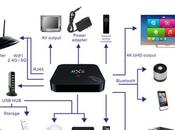 gPodder è uno strumento per ricevere/prendere podcast. Ci si può iscrivere a feed ("podcast") e scaricare automaticamente nuovi contenuti audio o video.
gPodder è uno strumento per ricevere/prendere podcast. Ci si può iscrivere a feed ("podcast") e scaricare automaticamente nuovi contenuti audio o video.Questi ultimi possono essere riprodotti sul computer o sincronizzati su iPod, lettori basati su MTP, lettori MP3 basati su file system e telefoni cellulari Bluetooth. Sono gestiti anche feed per video di YouTube.
gPodder è un programma di scaricamento gratuito, di rapida installazione e semplice utilizzazione. In realtà, non richiede d’installazione tradizionale ma scarichi l'archivio compresso in formato zip, l'estrai ed esegui il programma dall'applicazione.
Aprendosi l'interfaccia del programma appaiono due opzioni per elencare il tuo podcasts: scegliere di una lista di esempi o scarica direttamente le tue firme dal sito di gPodder.
Benché l'applicazione acceda di forma rapida ad una selezione dei podcasts popolari, tu stesso puoi scegliere quelli che desideri aggiungere manualmente.
Con gPodder potrai sottoscriverti a determinati canali audio e video e stare al tanto degli aggiornamenti. Potrai anche sincronizzare questi aggiornamenti con altri dispositivi come riproduttori MP3, iPods e telefoni mobili intelligenti.
gPodder non è solo un programma che si incarica di rivedere i podcasts al quale ti sia abbonato, ma lo aggiorna anche, scaricando i capitoli più nuovi.
Con questo programma potrai anche aggiungere e portare sul tuo podcasts mediante RSS od OPML, cercarli in YouTube e nella lista di gPodder. Puoi configurare il programma per limitare il numero di scaricamenti simultanei come definire il tempo che il podcast deve rimanere conservato nel tuo computer.
Installazione:
Basta andare in Ubuntu Software Center e l'installazione è molto semplice (per tutte le versioni di Ubuntu posteriori a Ubuntu 9.10 Karmic Koala).
Se invece siete degli "ubuntiani classici" (leggere vi piaceusare il terminal):
sudo apt-get install gpodder
Ecco le novità della nuova versione stabile rilasciata 3.0 "397/D" tratte dal sito del produttore:
This is the release you have been waiting for for nearly a year - gPodder 3.0.0, the first release of the "tres" branch is out and ready for you to give it a test drive. There are too many changes to list them one by one, so I'll just give you a high-level overview of what's in for you:
- Device synchronization removed: We have removed the ability to sync to iPod, MTP and filesystem-based MP3 players. You can store your gPodder data on your mobile device directly for now (using
$GPODDER_HOME) or wait for someone to implement a syncing plugin.- New on-disk structure: Instead of having "gpodder-downloads" in your home folder, and the database and settings hidden away in another folder, all gPodder data is now stored in "gPodder" in your home directory (on Linux) or in "gPodder" in you "My Documents" folder (on Windows) or on the mass storage (MyDocs partition) on the N900 and N9. The database format has also been overhauled, you can use the "gpodder-migrate2tres" script to convert your gPodder 2 data to gPodder 3. Because all data is now stored in one folder, you can now use the Desktop version of gPodder to work on e.g. the gPodder downloaded data on your mobile device by pointing the
$GPODDER_HOMEenvironment variable to the storage device.- EQL: The so-called "Episode Query Language" allows you to write queries against your podcasts. For example, you can use "(audio and downloaded and minutes < 10)" to show all downloaded audio files that are shorter than 10 minutes to listen to. This is very powerful, and can currently be used in the episode list of the GTK UI using "search-as-you-type".
- Improvements to the GTK UI, including support for showing the duration in the episode list, and hiding of columns in the episode list.
- New QML-based touch UI: In addition to the GTK UI and the command-line interface, gPodder 3 contains a QML UI for use with PySide. This UI can be used on touch-enabled netbooks/laptops and on mobile devices. The QML UI is the only mobile UI supported in 3.0.0 (replacing the Hildon UI in previous releases).
- Web UI: While this is still in its early stages, there is a small Web UI included that (when complete) will make it possible to manage gPodder via a web browser (with the help of a local, embedded web server).
- Refined backend / data model: The codebase has been cleaned up and restructured, so it should be easier to maintain and add to in the future.
- Support for Woodchuck: Neal Walfield has contributed a plugin for his Woodchuck framework. With Woodchuck installed, your device can detect which podcasts you like and automatically download the right episodes.
- Better support for Windows: The Windows launcher has been refined, and Windows users can now also use the CLI in addition to the GTK GUI. The new version will also use a system-wide installation of Python 2.7 and PyGTK, and auto-download the installers for these dependencies if they are not found. This means smaller package sizes and better disk usage.
- Dropped support for Maemo 4 (N800, N810) and Maemo 5 Hildon (N900)
- Added support for Maemo 5 QML (N900) and MeeGo 1.2 Harmattan (N9)
Per altri versioni:
Ubuntu 9.04 Jaunty Jackalope:
sudo apt-key adv --recv-keys --keyserver keyserver.ubuntu.com --recv-key 0xc18dc20e89617f48 & sudo echo "deb http://ppa.launchpad.net/thp/gpodder/ubuntu jaunty main" | sudo tee -a /etc/apt/sources.list & sudo apt-get update
Ubuntu 8.10 Intrepid Ibex:
sudo apt-key adv --recv-keys --keyserver keyserver.ubuntu.com --recv-key 0xc18dc20e89617f48 & sudo echo "deb http://ppa.launchpad.net/thp/gpodder/ubuntu intrepid main" | sudo tee -a /etc/apt/sources.list & sudo apt-get update
Download.
Screenshots.




 Se ti è piaciuto l'articolo , iscriviti al feed cliccando sull'immagine sottostante per tenerti sempre aggiornato sui nuovi contenuti del blog:
Se ti è piaciuto l'articolo , iscriviti al feed cliccando sull'immagine sottostante per tenerti sempre aggiornato sui nuovi contenuti del blog: 





